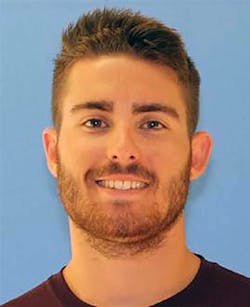Court reinstates hazing charges against 3 in 2017 fraternity death at Florida State
An appeals court has ruled that a former Florida State University fraternity president and two other men can face felony hazing charges in the 2017 death of a pledge who drank heavily at an off-campus party in Tallahassee.
WFSU News reports that a 1st District Court of Appeal panel voted 2 to 1 to overturn a Leon County circuit judge’s rulings that dismissed felony charges against former Pi Kappa Phi Fraternity chapter President Anthony Petagine and fraternity members Luke Kluttz and Anthony Oppenheimer.
The trio were charged in the death of Andrew Coffey, 20, a pledge from Broward County who died in November 2017 after drinking a large bottle of bourbon during a party in which pledges’ fraternity “big brothers” were revealed. The appeals court cases centered on whether prosecutors showed an adequate basis to pursue felony charges against Petagine, Kluttz and Oppenheimer.
The panel said Leon County Circuit Judge Martin Fitzpatrick improperly dismissed the felony charges.
Petagine did not attend the party that resulted in Coffey’s death, but had taken part in a meeting before the party in which the danger of pledges becoming intoxicated was discussed, the majority opinion said. Also, he had allowed liquor to be served at the party.
“This alone establishes that the state alleged a prima facie case of felony hazing, as underage drinkers are clearly more likely to become dangerously intoxicated in the context of a fraternity party in which that kind of behavior is encouraged and allowed, which is precisely the conduct targeted by the statute,” said the majority opinion, written by Judge Brad Thomas and joined by Judge Timothy Osterhaus. “The state presented sufficient facts that Mr. Petagine committed felony hazing by aiding and counseling actions and situations that recklessly or intentionally endangered the physical health or safety of the victim, which resulted in his death.”
Judge Ross Bilbrey dissented, writing that he does not believe “there are sufficient allegations of Petagine recklessly or intentionally creating a danger.” Bilbrey wrote that what is known as a “statement of particulars” offered by prosecutors did not allege that Petagine forced Coffey to drink alcohol.
“Without criminal hazing or some other criminal act being committed, Florida law does not make Petagine or other fraternity officers criminally liable for college drinking culture, even when that culture has tragic results,” Bilbrey wrote.
Coffey’s death drew widespread attention and led Florida State University to suspend Greek life and consider reforms to combat dangerous drinking at the university.
It also spurred state lawmakers in 2019 to pass a bill dubbed “Andrew’s Law” that seeks to strengthen anti-hazing laws and extends immunity to individuals who call law enforcement or medical personnel to help a hazing victim.
About the Author
Mike Kennedy
Senior Editor
Mike Kennedy, senior editor, has written for AS&U on a wide range of educational issues since 1999.
